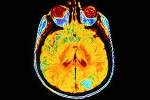Neuroscientist discovers potential treatment for ‘chemobrain’

 In a discovery that could one day help breast cancer patients, Dr Adam Walker from Neuroscience Research Australia (NeuRA) and UNSW Sydney has found a potential treatment for ‘chemobrain’, a condition that affects up to 60 per cent of women after receiving chemotherapy for breast cancer.[i]
In a discovery that could one day help breast cancer patients, Dr Adam Walker from Neuroscience Research Australia (NeuRA) and UNSW Sydney has found a potential treatment for ‘chemobrain’, a condition that affects up to 60 per cent of women after receiving chemotherapy for breast cancer.[i]
The study published today in PLOS-ONE and funded by the National Breast Cancer Foundation (NBCF) has the potential to transform cancer treatment research and eradicate the negative side-effects of cancer and chemotherapy.
Dr Walker says that up until now, scientists believed that chemotherapy was the only cause of cancer-associated cognitive impairment such as memory, learning and concentration difficulties, commonly dubbed as ‘chemobrain’.
“However, studies have observed cognitive impairment in cancer patients prior to treatment,” says Dr Walker.
“This suggests the cancer alone may be sufficient to induce cognitive impairment, but the mechanisms through which this occurs are unknown.”
In his study using animal models, Dr Walker targeted tumour-to-brain communication and found that breast cancer cells released inflammatory markers that cause inflammation in the brain.
He found that a low dose of anti-inflammatories completely blocked breast cancer cells from causing memory loss without affecting other aspects of the disease.
“This suggests that the tumour itself can actually hijack the brain via inflammation to cause cognitive impairment, but that we can use anti-inflammatories to block this process.
“Interventions to treat cancer-induced cognitive impairment have so far focused on behavioural therapies such as brain training, which don’t tap into the biological processes of tumour-to-brain communication,” says Dr Walker.
“This is the first study to show that we can potentially disrupt that communication using anti-inflammatory agents such as aspirin to reduce the inflammation that causes cognitive impairment.”
CEO of NeuRA Professor Peter Schofield said this innovative new research has the potential to transform how cancer patients view and manage their treatment.
“This work represents a new frontier for neuroscience in cancer research.”
“Our ultimate goal is to eradicate the negative side effects of cancer treatment, so that quality versus quantity of life decisions no longer need to be made.”
“Chemobrain has long been an issue for breast cancer patients who have been treated with chemotherapy,” says Dr Chris Pettigrew, NBCF Director of Research Investment.
“This new development is a big win for research and for the 68,824 Australians living with breast cancer.”[ii]
The next phase of Dr Walker’s work is to look at how anti-inflammatories might block other aspects of ‘chemobrain’ such as learning and concentration difficulties, followed by clinical trials.
“We think anti-inflammatory drugs could be a potentially cheap and safe intervention to prevent and treat chemobrain, but we need to learn more about who should take them and when during the cancer journey,” says Dr Walker.
NOTES
Neuroscientist discovers potential treatment for ‘chemobrain’
EMBARGOED:
6am AEDT Friday, 7 December 2018
In a discovery that could one day help breast cancer patients, Dr Adam Walker from Neuroscience Research Australia (NeuRA) and UNSW Sydney has found a potential treatment for ‘chemobrain’, a condition that affects up to 60 per cent of women after receiving chemotherapy for breast cancer.[i]
The study published today in PLOS-ONE and funded by the National Breast Cancer Foundation (NBCF) has the potential to transform cancer treatment research and eradicate the negative side-effects of cancer and chemotherapy.
Dr Walker says that up until now, scientists believed that chemotherapy was the only cause of cancer-associated cognitive impairment such as memory, learning and concentration difficulties, commonly dubbed as ‘chemobrain’.
“However, studies have observed cognitive impairment in cancer patients prior to treatment,” says Dr Walker.
“This suggests the cancer alone may be sufficient to induce cognitive impairment, but the mechanisms through which this occurs are unknown.”
In his study using animal models, Dr Walker targeted tumour-to-brain communication and found that breast cancer cells released inflammatory markers that cause inflammation in the brain.
He found that a low dose of anti-inflammatories completely blocked breast cancer cells from causing memory loss without affecting other aspects of the disease.
“This suggests that the tumour itself can actually hijack the brain via inflammation to cause cognitive impairment, but that we can use anti-inflammatories to block this process.
“Interventions to treat cancer-induced cognitive impairment have so far focused on behavioural therapies such as brain training, which don’t tap into the biological processes of tumour-to-brain communication,” says Dr Walker.
“This is the first study to show that we can potentially disrupt that communication using anti-inflammatory agents such as aspirin to reduce the inflammation that causes cognitive impairment.”
CEO of NeuRA Professor Peter Schofield said this innovative new research has the potential to transform how cancer patients view and manage their treatment.
“This work represents a new frontier for neuroscience in cancer research.”
“Our ultimate goal is to eradicate the negative side effects of cancer treatment, so that quality versus quantity of life decisions no longer need to be made.”
“Chemobrain has long been an issue for breast cancer patients who have been treated with chemotherapy,” says Dr Chris Pettigrew, NBCF Director of Research Investment.
“This new development is a big win for research and for the 68,824 Australians living with breast cancer.”[ii]
The next phase of Dr Walker’s work is to look at how anti-inflammatories might block other aspects of ‘chemobrain’ such as learning and concentration difficulties, followed by clinical trials.
“We think anti-inflammatory drugs could be a potentially cheap and safe intervention to prevent and treat chemobrain, but we need to learn more about who should take them and when during the cancer journey,” says Dr Walker.
For more information or media enquiries contact:
Rachel Zarb, NeuRA
M: +61(0)405944755
E: [email protected]
Sophie Cooley, NBCF
M: +61(0)417421683
E: [email protected]
Download digital assets: https://drive.google.com/open?id=1kAISTWsihAiDUBLedND45-XeR3IHKnDp
Included:
· Chemobrain case study
· Infographic
· Video content
CV overview:
Dr Adam Walker completed his PhD in psychology at the University of Newcastle in 2011. He spent a year at the University of Illinois as a postdoctoral researcher in the lab of integrative immunophysiology, followed by three years in Houston, Texas as a postdoctoral researcher at the MD Anderson Cancer Center. He returned to Australia in 2015 and joined Monash University as a National Breast Cancer Foundation research fellow, investigating the mechanisms underlying cognitive and psychiatric side-effects of cancer and its treatment.
NeuRA overview:
Neuroscience Research Australia (NeuRA) is an independent, not-for-profit research institute based in Sydney, Australia. As a leader in brain and nervous system research, our goal is to prevent, treat and cure brain and nervous system diseases, disorders and injuries through medical research.
NBCF overview:
The National Breast Cancer Foundation (NBCF) is Australia’s leading national body funding game-changing breast cancer research with money raised entirely by the Australian public.
We receive no government funding. What we do, would not be possible without the support and generosity of people and organisations like YOU. Our mission is simple: stop deaths from breast cancer. How? By identifying, funding and championing world-class research - research that will help us detect tumours earlier, improve treatment outcomes, and ultimately – save lives.
[i] National Cancer Institute: https://www.cancer.gov/about-cancer/treatment/research/understanding-chemobrain
[ii] Cancer Australia: https://breast-cancer.canceraustralia.gov.au/statistics

Recent comments